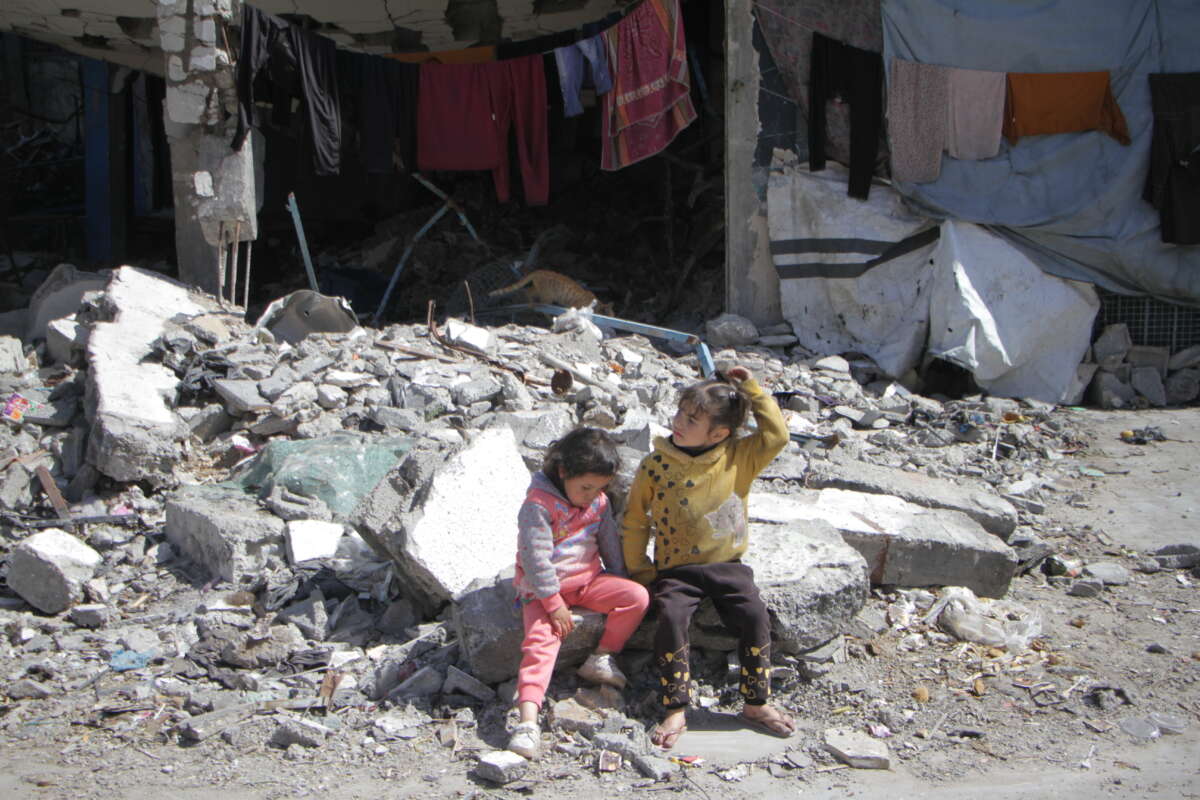Support justice-driven, accurate and transparent news — make a quick donation to Truthout today!
Israeli forces on Saturday killed more than a dozen displaced Palestinians in a targeted attack on a United Nations-run school in central Gaza, the latest bombing of an education facility as Israel’s assault on the besieged enclave entered its 10th month.
Video footage from the scene of the attack on the al-Jaouni school in central Gaza’s al-Nuseirat refugee camp shows puddles of blood on the ground amid the ruins of a building destroyed in the bombing, which reportedly killed at least 16 people and injured over 75 more, children among them.
The Israeli military confirmed it carried out the attack, claiming without evidence that the school was used by Hamas operatives.
“Another day, another bombing of kids at a U.N. refugee school, another set of children mangled beyond recognition, livestreamed for all the world to see,” said Vincent Wong, an assistant professor at the University of Windsor.
Trita Parsi, executive vice president of the Quincy Institute for Responsible Statecraft, asked, “Why have we allowed this to become normal?”
Saturday’s bombing of al-Jaouni was one of many attacks Israel’s military has carried out against U.N.-run schools since its latest assault on Gaza began in October following a deadly Hamas-led attack. Last month, Israel used U.S.-made small-diameter bombs in an attack on a U.N. school that killed 14 children.
Israeli forces have damaged or destroyed 80% of Gaza’s schools, including all of its universities — harm that will reverberate for generations. U.N. experts have said it is “reasonable to ask” if Israel is guilty of “scholasticide,” defined as “the systemic obliteration of education through the arrest, detention, or killing of teachers, students, and staff, and the destruction of educational infrastructure.”
Chandni Desai, an assistant professor at the University of Toronto, noted in a Guardian op-ed last month that Israeli soldiers recently “set ablaze the remaining parts of the al-Aqsa University’s library in Gaza City and photographed themselves sitting in front of the burning books.”
“Similarly, an Israeli soldier recently filmed himself walking through the ruins of al-Azhar University, mocking scholasticide and rejoicing in the occupation’s destruction of the university,” Desai wrote. “‘We’re starting a new semester,’ he said, adding: ‘It’ll start never.'”
Now in month 10, Israel’s war on Gaza has killed more than 38,000 people and wounded nearly 90,000, with tens of thousands more believed to be trapped under the ruins of bombed-out buildings.
Citing unnamed medical sources, Al Jazeera reported Sunday that at least “15 Palestinians had been killed in Israeli bombing across the Gaza Strip since dawn.”
The wave of Israeli attacks came amid reports of progress toward a possible cease-fire and hostage-release agreement. The U.S., which has supported Israel’s assault with weaponry and diplomatic cover, described Hamas’ latest cease-fire proposal as a “breakthrough,” but it’s far from clear Israel will accept the terms even in the face of massive domestic protests demanding a deal.
According to The New York Times, Hamas is pushing for “international assurances that, once an initial truce kicks in, both sides will keep negotiating until they reach a final deal to end the war and free all of the hostages remaining in Gaza.”
“In effect, Hamas wants to ensure that it does not turn over many of the hostages only for Israel to restart the war,” the Times reported, citing unnamed officials. “Israeli negotiators immediately rejected that demand… Israel wants the option to resume fighting if it deems it necessary.”
Egypt is expected to host U.S. and Israeli delegations for a fresh round of cease-fire talks, which could drag on for weeks as Israel’s military continues to bomb Gaza and starve its population.
A terrifying moment. We appeal for your support.
In the last weeks, we have witnessed an authoritarian assault on communities in Minnesota and across the nation.
The need for truthful, grassroots reporting is urgent at this cataclysmic historical moment. Yet, Trump-aligned billionaires and other allies have taken over many legacy media outlets — the culmination of a decades-long campaign to place control of the narrative into the hands of the political right.
We refuse to let Trump’s blatant propaganda machine go unchecked. Untethered to corporate ownership or advertisers, Truthout remains fearless in our reporting and our determination to use journalism as a tool for justice.
But we need your help just to fund our basic expenses. Over 80 percent of Truthout’s funding comes from small individual donations from our community of readers, and over a third of our total budget is supported by recurring monthly donors.
Truthout has launched a fundraiser to add 460 new monthly donors in the next 8 days. Whether you can make a small monthly donation or a larger one-time gift, Truthout only works with your support.
